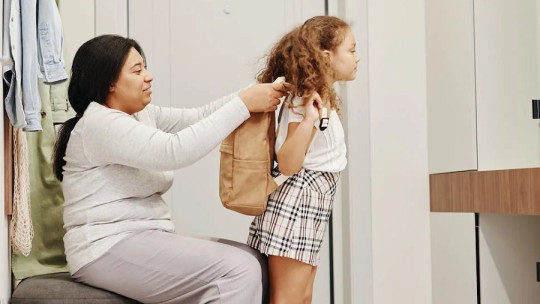Vacations are probably the most anticipated time of the year, especially during childhood and adolescence in which, for most cases, vacations represent a period of disconnection and change of routine. During them, adolescents enjoy free time, have fun with friends and family and, in many cases, explore new places and experiences.
Inevitably, the end always comes, and with it a mix of emotions appears that compromise well-being.
Returning to class after the holidays is decisive for the majority of teenagers It is a time when you experience a roller coaster of emotions that can be incoherent, leaving rest and fun behind to once again face academic and social responsibilities. Good emotional management during this transition and adaptation can make a big difference in the well-being and performance of young people.
It is essential to understand how emotional changes can affect the general well-being of adolescents in order to know how to equip them with tools to face this transition to a new school year in a positive and healthy way. In this article, we will explore the importance of this emotional management addressing different emotional challenges they face and strategies for a healthy adaptation and mitigating their negative consequences.
The importance of vacations for teenagers
Vacations play a fundamental role in the emotional and vital development of adolescents, as they present opportunities to disconnect from the daily routine and enjoy rest, while seeking experiences that nourish personal identity and encourage enjoyable activities. This break is essential to recharge energy and revitalize both body and mind, contributing to better mental and emotional health.
1. Explore new interests
As we have been commenting, vacations give a perfect opportunity for teenagers to dedicate time to some activity or interest that they have not had as much time to explore during the school year due to the responsibilities and obligations that this entails. This strengthens their capacity for emotional resilience and situational adaptation, learning to build situations in which they feel safe and can experience confidence to develop their interests This is fundamental in the life of every adolescent since it contributes to the construction of their personality and their adaptation to social life.
2. Establish meaningful connections
In relation to the adaptation to social life that we were discussing previously, vacations are a perfect time for teenagers to have the opportunity to establish meaningful connections with their friends and family. Share so much time and experiences with a circle of people encourages stronger ties to be generated, contributing to a sense of belonging and social support Developing social skills during adolescence is just as important for building an identity as exploring one’s own interests.
3. Feeling homesick
Summer and the return of vacation determine the first feelings of nostalgia in adolescents. Nostalgia is defined as a generalized sadness linked to a past time or experience. Experiencing nostalgia for the first time is important for the natural process of emotional adaptation ; It is key to learn to manage these emotions in a healthy way to prevent them from interfering with your well-being and academic performance once classes return.
Emotional challenges when returning to school
As we have been discussing, returning to school after the holidays can present various emotional challenges for teenagers. These challenges can vary depending on personality, previous experiences, and individual expectations. It is important to know them to know what emotional management strategies to propose or encourage. Some of the most common challenges that young people face during this transition are the following:
1. Anxiety about the unknown
The change in routine and uncertainty that accompanies the start of a new school year can generate anxiety in adolescents. Questions about new teachers, classmates, or the difficulty of subjects can cause worry and nervousness.
2. Academic stress
The prospect of facing exams, projects and homework can increase stress levels in teenagers. The pressure to obtain good results and meeting academic expectations can be overwhelming.
3. Resistance to change
Some teenagers may feel resistance to change and prefer to stay in their comfort zone. The return to school represents a break with the familiarity of the holidays which can generate emotional resistance.
4. Difficulties in resuming routine
After enjoying a more flexible schedule during the holidays, adjusting back to the structure and responsibilities of school can take time and effort.
5. Social pressure
Returning to school also involves facing social dynamics, such as being part of groups or dealing with conflicts between classmates. Peer pressure can affect teens’ self-esteem and confidence.
Strategies for healthy emotional management
So that teenagers can face returning to school after the holidays in a healthy way, it is important that they have effective strategies to manage their emotions. Teaching adolescents to manage their emotions during the return to school after the holidays not only allows them to adapt healthier, but also lays the foundation for the development of valuable emotional skills throughout their lives. In conclusion, here are some suggestions that may be useful:
1. Open communication
Foster an environment of open, non-judgmental communication at home and at school. Encourages teens to express their emotions and concerns, allowing them to feel heard and understood
2. Set realistic goals
Helps teens set achievable academic and personal goals. Making a plan to achieve these goals can help them feel more confident and prepared to face the challenges of the new school year without becoming overwhelmed.
3. Organization and planning
Helps teenagers organize their time and schoolwork. Proper planning will allow them to face their responsibilities more efficiently and avoid the feeling of being overwhelmed with multiple activities.
4. Maintain social connections:
Encourage teens to maintain their friendships and support each other as they return to school. Having the support of friends can make the adaptation process more bearable. ###5. Avoid social comparison: Help adolescents understand that each person has their own pace of adaptation and that it is not productive to compare themselves with others. Each individual is unique and faces different challenges.
6. Seek professional support
If teens are dealing with intense or persistent emotions, it is advisable to seek support from a professional, such as a psychologist or school counselor.









